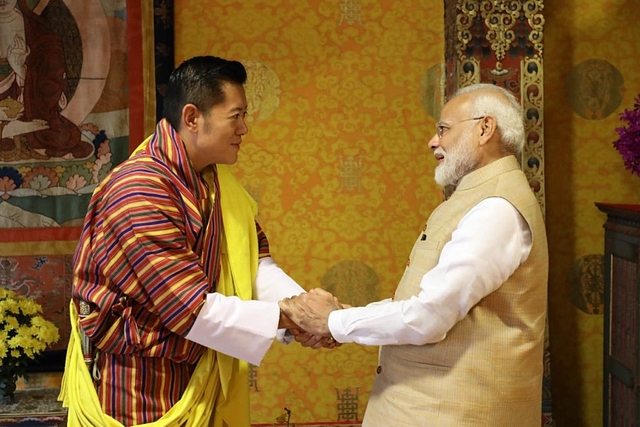
Modi’s Bhutan Visit Was Different From His Other Foreign Trips
It was imperative for Modi to take the first step in weaning Bhutan’s GenNext away from the pernicious influence of China. And with his widely-acknowledged communication skills, Modi did just that.
Bhutanese Prime Minister Tshering said that Modi had “touched hearts and inspired minds” during his visit.
Prime Minister Narendra Modi’s just-concluded visit to Bhutan was unlike most of his other foreign trips.
Not only did he unveil a new and exciting chapter in the ties between India and the Himalayan kingdom, his visit was very high on the ‘emotional connect’ aimed especially at Bhutan’s young and aspiring populace.
There was a compelling reason for Modi to reach out to Bhutan’s ‘GenNext’. Unlike the elderly and middle-aged Bhutanese who are very attached to India, the younger lot in Bhutan are more exposed to the world.
“They have, in recent times, been more enamoured with China. China’s achievements in many fields and its emergence as a world power excites them.
“China has also been actively wooing the younger generation in Bhutan through academic and youth exchange programmes, funding study visits and targeting young Bhutanese men and women who study in countries like Australia,” said a Bhutan observer.
It was, thus, imperative for Modi to take the first step in weaning Bhutan’s GenNext away from the pernicious influence of China. And with his widely-acknowledged communication skills, Modi did just that.
His well received speech to students at the Royal University of Bhutan on Sunday was the real highlight and the pivotal part of the visit. Modi, through his inspirational address, tugged at the heart-strings of the young of Bhutan.
He highlighted the shared history and geography between India and Bhutan, kindled among the youth a pride in their civilisational heritage and spiritual ethos, and highlighted the vistas of cooperation in various fields between the two countries.
He spoke of the advances being made by India that Bhutan can benefit from and inspired the youngsters to become scientists, innovators, entrepreneurs, sports persons, leaders and artistes.
Modi’s “find your real calling and pursue it with full passion” exhortation to Bhutan’s GenNext found an inspirational echo among them.
In fact, local newspapers used this phrase in their headlines on their effusive coverage of Modi’s visit and a huge number of social media users in Bhutan posted it on their timelines and tweeted it.
Immediately after Modi took off from Paro airport in the special IAF aircraft, Bhutan’s Prime Minister, Lotay Tshering, announced that the visit was “successful, especially in terms of strengthening heart-to-heart connection” and termed his interactions with Modi as a “spiritual experience”.
For Tshering, too, the visit held a lot of significance. He came to power last year on the promise of addressing the concerns and meeting the aspirations of the youth.
Thus, technological advances, rapid improvement in public healthcare, job creation and making world-class education available to his country’s GenNext was imperative.
To Tshering’s delight, Modi’s visit led to firming up agreements that will help the Bhutanese Prime Minister achieve his objectives. Ten MoUs on education, research, space technology, medicine and aviation safety were signed and exchanged.
These, said Tshering, will lead to unprecedented levels of cooperation between the two countries in various fields.
For many decades, cooperation between India and Bhutan was limited to building hydro-power projects, roads and other infrastructure in the Himalayan kingdom, as well as providing monetary aid to Bhutan.
Over time, and not least because of China playing mischief, India began to be perceived as being selfish: India’s aid to set up hydro-power projects in Bhutan was seen to be motivated by India’s own growing energy needs.
And there has been some criticism in recent years about the dangers posed to Bhutan’s fragile ecology by investing in hydro-power projects.
Thus, India had to move beyond hydro-power projects and offer Bhutan a slice of its own advances in various fields. Modi inaugurated the India-funded ground station of South Asia Satellite that will help Bhutan in tele-medicine, distance education, banking and TV broadcasting.
Bhutan’s budding space scientists will work with ISRO in developing and launching Bhutan’s own satellite in the near future.
Modi inaugurated the inter-connection between India Knowledge Network and Bhutan’s Druk Research & Education Network (DrukREN) that will connect universities, research institutions, libraries, laboratories, healthcare and agricultural institutions between the two countries.
Many other synergies between various institutions in India and Bhutan have been initiated. The Royal University of Bhutan has been linked to the IITs in Kanpur, Delhi, Kharagpur and Mumbai for academic cooperation in STEM subjects and exchanges of faculty, research scholars and students.
The National Legal Institute of Bhutan and the National Judicial Academy of India, as well as the Jigme Singye Wangchuck School of Law and the National Law School of India, University of Bangalore have signed similar academic cooperation agreements.
Bhutan had already been promised Rs 5,000 crore as aid for its 12th five-year-plan that commenced earlier this year. There are indications that this amount would be enhanced.
Hydro-power, of course, remains a crucial area of cooperation between the two countries and Modi inaugurated the 740 MW Mangdechhu hydroelectric power project.
This is the fourth such plant built with India’s assistance in Bhutan and it has enhanced Bhutan’s installed hydro-power generation capacity to 2326 MW from the earlier 1600 MW.
The decks have been cleared for commencing work on the 2500 MW Sunkosh Hydroelectric Power Project during the delegation-level talks.
Modi’s Bhutan visit, thus, can be said to have given Indo-Bhutan ties a much-required new direction that meets the aspirations of the kingdom’s GenNext and will go a long way in countering China’s aggressive overtures to Bhutan’s young and ambitious.
Modi’s two-day visit opened exciting vistas for Bhutan’s aspirational young. Modi’s direct appeal to that country’s young to become a part of advances being made by India found instant takers.
No wonder, then, that Prime Minister Tshering said that Modi had “touched hearts and inspired minds” during his visit.